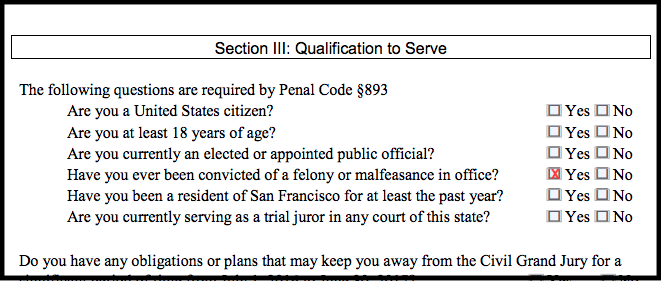Editor’s Note: Between now and the end of December, NewsMatch will instantly double every donation WitnessLA receives.
WitnessLA has made, and continues to make, a measurable difference in the world of justice, particularly in the complex realm of Los Angeles County.
But we need your help to continue this crucial work.
DONATE HERE AND GET YOUR $$$ DOUBLED!
Every donation to WitnessLA is tax-deductible.
My Turn: Why Excluding Convicted Felons From Juries Is a Bad Idea
By James M. Binnall, CALMatters
I was admitted to the State Bar in 2008 and began my legal career as a criminal defense attorney. A year later, I was called for jury duty for the first time as a California resident.
I felt a sense of pride when I arrived at the San Diego County courthouse and passed through security using the entrance designated for attorneys. A clerk instructed prospective jurors to complete juror qualification questionnaires. Included among the questions was one asking if I ever had been convicted of a felony.
I answered “yes.”
In 1999, I was driving under the influence in a wreck that claimed the life of my close friend. I was convicted of DUI homicide in Pennsylvania and spent four years, one month, and six days in two maximum-security prisons.
Moments later, a clerk informed me that I was ineligible for jury service because of my conviction.
California permanently bans citizens with a felony criminal record from jury service. When I protested that I was an attorney and had used the “special” courthouse entrance, the clerk said I should write my congressman.
I left, deflated, but set about researching juror exclusion policies aimed at citizens with a felony criminal history. I found that 29 states and the federal system allow citizens who are felons to be admitted to the bar and practice law but ban them from serving as jurors in criminal or civil matters.
In other words, I can represent a defendant in a death penalty case, but cannot sit on a jury in a minor traffic accident or breach of contract case. And I am not alone.
Today, an insidious byproduct of our experiment with mass incarceration is the normalization of a felony criminal record.
Roughly 19 million American adults, including one in three African-American men, bear the mark of a felony conviction. In California, 12 percent of adult African-Americans have spent time in prison, the highest rate in the nation.
As a result, as we “cleanse” our juries of citizens with a felony criminal record, we racially homogenize a fundamental democratic institution intended as a vehicle for direct democratic participation.
Courts and lawmakers justify record-based juror exclusion statutes by alleging that citizens with a felony criminal record lack the character to decide a judicial matter and harbor an inherent bias in favor of criminal defendants and against prosecutors.
Research supports neither of these justifications.
Instead, studies demonstrate that citizens who have been convicted of felonies contribute meaningfully to jury deliberations, recognize the seriousness of the process, engage fellow jurors, and impartially review case facts.
Research also shows that the biases of people with felonies are as varied as those of the rest of the community and statistically indistinguishable from many other groups of eligible jurors.
No one argues that jury service alone is enough to help people convicted of felonies avoid re-incarceration. But research does suggest that inclusion in the process reduces the stigma of conviction and fosters feelings of societal acceptance. Jury service builds self-esteem, social capital, and community engagement.
Still, California ignores the jury as a pro-social vehicle for change and instead justifies the exclusion of millions of its citizens from jury service based on nonexistent threats they pose to the jury system.
In short, excluding felons from juries is a bad solution in search of a problem.
So how do we conceive of our juries going forward? Are they destined to become collections of only those citizens privileged–or, rather, lucky–enough to be free from any contact with the criminal justice system? Is that a true cross-section of our community?
California is a progressive beacon. Yet, on this issue, we are woefully behind the science. A citizen who bears the mark of a felony conviction poses no more of a threat to a jury than does any other citizen who has at some point lied, cheated, stolen, or made a mistake, but has never been caught.
And like those citizens, prospective jurors with a felony criminal history ought to be allowed to take part in jury selection, to help ensure that our juries reflect our citizenry.
Dr. James Binnall is a professor in the School of Criminology, Criminal Justice & Emergency Management at Long Beach State University, james.binnall@csulb.edu. He wrote this commentary for CALmatters.


The only reason the issue of restoring voting rights to felons is the The DNC believes most will vote Democrats. The Democrat Party was central in ensuring they wouldn’t have the ability to vote but now sees an advantage. They may find former felons a bit more conservative. But in reality it is just a big joke.
Illegal aliens who pour over the border and seek free money from the tit of America, felons with restored voting rights, “harvested” votes – VIRTUALLY ALL GO IN FAVOR OF DEMOCRATS.
The left knows what they’re doing is detrimental to America, but since it serves their agenda and keeps them in power, it’s fair game.